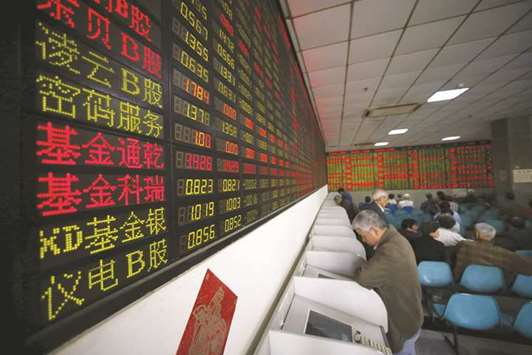China stocks fell yesterday, with the start-up board ChiNext posting its biggest decline in three weeks as expectations of tighter monetary polices stirred worries about market liquidity.
China is likely to set its 2018 money growth target at an all-time low of around 9% to curb debt risks and contain asset bubbles, the official China Daily reported yesterday, citing economists involved in high-level policy discussions.
At the close, the Shanghai Composite index was down 16.22 points or 0.49% at 3,280.84 points. The blue-chip CSI300 index was down 0.31%, with its financial sector sub-index lower by 0.14%, the consumer staples sector up 0.3%, the real estate index up 1.89% and healthcare sub-index up 0.32%.
The smaller Shenzhen index ended down 0.93% and the start-up board ChiNext Composite index was weaker by 1.32%.
The largest percentage gainers in the main Shanghai Composite index were First Tractor Co up 10.07%, followed by Wenyi Suntech Co gaining 10% and Chifeng Jilong Gold Mining Co up by 9.97%.
The largest percentage losses in the Shanghai index were Luenmei Quantum Co down 10%, followed by Anhui Leimingkehua Co losing 9.97% and Nanjing Textiles Import & Export Corp down 7.59%.
About 14.69bn shares were traded on the Shanghai exchange, roughly 92.7% of the market’s 30-day moving average of 15.85bn shares a day.
The volume in the previous trading session was 12.40bn.
China’s A-shares were trading at a premium of 30.03% over the Hong Kong-listed H-shares.
The Shanghai stock index is below its 50-day moving average and above its 200-day moving average. Meanwhile the Tokyo stocks closed slightly higher yesterday in quiet trading, with investors sidelined by the Christmas holiday.
The benchmark Nikkei 225 index edged up 0.16%, or 36.42 points, to end at 22,939.18, while the broader Topix index was up 0.16%, or 2.85 points, at 1,831.93.
“Trading is very thin in holiday mode with a lack of foreign investors,” said Toshikazu Horiuchi, a broker at IwaiCosmo Securities.
“Players are feeling a sense of achievement after the US tax cut was finally completed,” Horiuchi told AFP.
Presient Donald Trump brought forward a bill signing originally slated for January to fulfil a promise to deliver tax cuts by Christmas.
US stocks repeatedly set records earlier in the month in anticipation of the measure, but began to sag last week as the proposal cleared the final hurdles in Washington.
In Tokyo share trading, Toyota was flat at ¥7,282, while Nissan rose 0.67% to ¥1,128. Panasonic gained 0.39% to ¥1,674.5, while Sony dipped 0.02% to ¥5,191. Banks were lower, with Sumitomo Mitsui Financial dropping 1.17% to ¥4,917 and Mitsubishi UFJ falling 0.72% to ¥839.8. The yen changed hands at ¥113.25 in Asian trade, compared with ¥113.28 in New York late Friday.
Chinese stocks ended down yesterday as the sell-off in small-caps dragged down the market, dealers said. The benchmark Shanghai Composite Index lost 0.50%, or 16.60 points, to 3,280.46.
The Shenzhen Composite Index, which tracks stocks on China’s second exchange, fell 0.93%, or 17.67 points, to 1,883.89.
“Small-caps brought down the market amid lingering year-end worries,” said Li Daxiao, an analyst with Yingda Securities. Hong Kong’s stock market was closed for a public holiday along with most Asian markets.

Investors look at computer screens showing stock information at a brokerage house in Shanghai. The Shanghai Composite index closed down 16.22 points to 3,280.84 yesterday.
